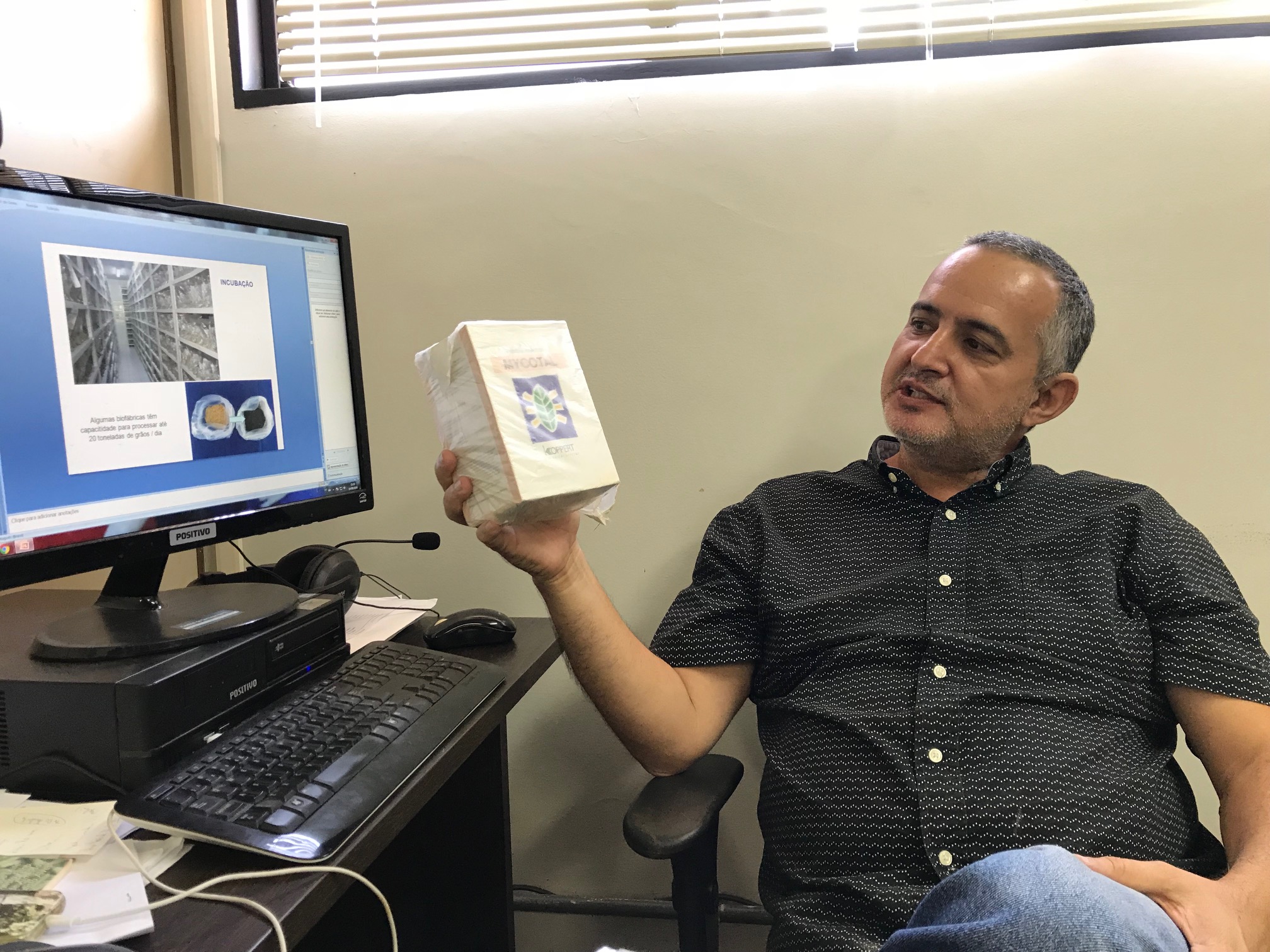Process that increases fungi-based bioinsecticide's shelf life is newly patented by Embrapa
Process that increases fungi-based bioinsecticide's shelf life is newly patented by Embrapa
Photo: Irene Santana

Marcos Faria is the inventor of Embrapa's Shelf Life Technology, TEV, from the acronym in Portuguese
Methodology will help companies increase the added value of fungal products
Until recently, one of the greatest difficulties faced by farmers who used fungi-based biological insecticides to fight different types of pests was storage, as products lasted only a few weeks in sheds aimed at storing agrochemicals. A technology developed by Embrapa in 2010 foundthe solution for this problem, and on May 15, 2018, the National Industrial Property Institute (INPI) recognized the innovative nature of the invention and granted the Letters Patent N.PI 1002615-0.
The method “Packaging in modified atmosphere to increase fungi's shelf life” was named TEV after the acronym for Embrapa Shelf Life Technology in Portuguese, by its inventor, the researcher from Embrapa Genetic Resources and Biotechnology Marcos Rodrigues de Faria. TEV is the result of his PhD in Entomology from Cornell University (USA) in 2009, advised by Dr. Stephen Wraight, from the United States Department of Agriculture's Agricultural Research Service - USDA-ARS.
The challenge Marcos Faria proposed was to substantially increase the durability of fungi-based products stored at an average temperature of 30ºC or higher, the real conditions of most storage sheds in Brazil, to make this type of product more tradeable. “While the validity of chemical products is measured in years, fungi-based biological ones' is in months, even weeks. Due to the fast deactivation of these products during storage in rural properties, this makes many farmers often think that biological control does not work, which is not true”, Faria explains.
During the research to develop the TEV, the researcher obtained an unprecedented result: maintaining over 80% of the fungal propagules (spores) active after storing them for six months at an average temperature of 40ºC (see table). The same test, carried out for 16 months at the same temperature, showed that the viability of the material was still above 70%, which proved the effectiveness of the storage method developed by Embrapa.
| Comparative table of fungus storage technologies | ||
|
| Previous technique | TEV/Embrapa |
| Temperature | 37ºC | 40ºC |
| Active spores | 74% | 80% |
| Shelf life | 2 months | 6 months |
Methodology
The TEV - Embrapa Shelf Life Technology is a method of packing entomopathogenic fungal spores that consists of the adoption of two simultaneous measures: drying the product at extremely low levels (below 0.1 water activity or, ideally, between 0.02 and 0.03) and reducing oxygen within the packaging to very low levels.
Such conditions can be reached through special packets already available in the market that modify the internal atmosphere where the product is stored. “With such moisture and oxygen levels, we were able to reduce most of the fungi's metabolic activity, maintaining their viability for long periods”, Marcos Faria explains.
The technique was developed for entomopathogenic fungi, that is, fungi that kill insects, and tested in several fungi used in Brazil for the biological control of insect pests. These include: Metarhizium anisopliae, which is used to control sugarcane spittlebug and today it is already applied in more than a million of hectares all over the country, and Beauveria bassiana, used to control white flies and the coffee borer beetle. It is also applicable to antagonistic fungi such as the Trichoderma genus, applied in crops such as beans and soybean for disease management.
TEV could increase the market for fungi-based products in the country
The use of fungus-based biological products to control agricultural pests has significantly increased in Brazil. According to data from the Brazilian Ministry of Agriculture, Livestock and Food Supply (MAPA), currently there are 19 microbial agents and 82 registered products, of which 38 products are based on entomopathogenic fungi. At a world level it is estimated that there are records of over 200 fungi-based products to control insects.
According to Faria, despite the trend of producing biological control products on farm (that is, by farmers themselves), TEV is recommended for technified mid- and large-sized companies, as it requires the use of special air-tight packaging and packets to work.
Some private companies have recently demonstrated interest in the technology, which proves the sector's concern in improving the quality of biological products. "We hope that TEV can contribute to increasing the quality of biological products and their acceptance by Brazilian farmers, and thus collaborate towards a healthier agriculture that is less dependent on chemical products”, the researcher aims.
For partnerships:
Companies that are interested in licensing the technology can contact Embrapa Genetic Resources and Biotechnology's Technology Transfer team by email: cenargen.sipt@embrapa.br
Irene Santana (MTb 11.354/DF)
Embrapa Genetic Resources and Biotechnology
Press inquiries
cenargen.nco@embrapa.br
Phone number: +55 61 3448-4769
Further information on the topic
Citizen Attention Service (SAC)
www.embrapa.br/contact-us/sac/
